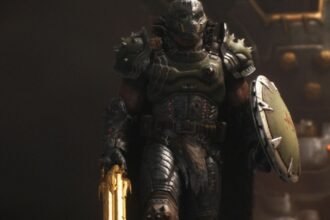Certainly! Here’s a revised version of the content while maintaining the original context and ideas:
The most recent Marvel Cinematic Universe film, Thunderbolts, boldly addresses the theme of depression. The movie begins with Yelena Belova (played by Florence Pugh), a state assassin turned mercenary, reflecting on the “emptiness” that envelops her life, acknowledging her inability to connect or find joy in the things she once loved. Throughout the narrative, various characters grapple with emotional suppression and self-medication as coping mechanisms to manage their hopelessness, exploring everything from substance abuse to recognizable forms of emotional withdrawal. The climax involves a physical confrontation with a powerful embodiment of one character’s deep-seated despair and self-loathing. It’s a quintessential superhero moment—watching a character literally punch away their depression—providing a cathartic release for those who have faced similar challenges, even if it’s not a pragmatic solution in reality.
Amidst a current surge of horror films that transform anxiety and PTSD into palpable monsters, it’s peculiar to see the Marvel franchise take on mental health challenges in such a visceral way. Thunderbolts serves as both a cinematic exploration of various mental health therapies, including cognitive behavioral therapy and exposure therapy, alongside its action-adventure narrative. Yet, at the end of the film, there remains a noticeable void. While the writers and director Jake Schreier capture certain truths about mental illness, some elements of the messaging feel awkward, especially during pivotal moments, leaving viewers—particularly those with personal experience of depression—somewhat unsettled.
[Ed. note: Major spoilers for Thunderbolts, including key plot revelations.]
Throughout much of the film, Yelena represents the metaphorical face of depression. Her journey revolves around confronting her own feelings of hopelessness and fatigue before reaching out to others who exhibit similar struggles. This complex character arc includes emotionally charged moments where she lashes out at her adoptive figure, Red Guardian (David Harbour), expressing how guilt, grief, and isolation have consumed her. She also grapples with hurting those she is trying to connect with, illustrating the tumultuous nature of mental health.
The core conflict of the film emerges through Bob (Lewis Pullman), an experimental test subject whom Yelena and her mercenary allies—John Walker from The Falcon and the Winter Soldier, Ghost from Ant-Man and The Wasp, and the troubled Taskmaster from Black Widow—encounter in a bunker designed for their demise. During their attempt to escape, Bob expresses feelings of worthlessness, suggesting it might be better for everyone if he stayed locked away. Yelena sees this familiar self-destructive mindset and attempts to uplift him, helping him recognize his value while simultaneously confronting her own struggles.
Bob subsequently gains a sense of self-worth through the movie’s antagonist, Valentina Allegra de Fontaine (Julia Louis-Dreyfus), who attempts to mold him into the Sentry—a hero under her control. Yet, her plans backfire, unleashing the Void, a formidable force that plunges everything into darkness. This literal depiction of depression is striking, especially as the Void blankets Manhattan, whispering messages of futility and self-doubt into Bob’s psyche.
Those who’ve battled against depression will resonate with the Void’s damaging whispers, recognizing the inner dialogue that can say things like "You’ve ruined everything" or "You have no value.” Bob’s frustration with this negative self-talk leads him to lash out, but Thunderbolts insightfully highlights that such rage, while powerful, is not a sufficient solution in combating this internal darkness. Surprisingly, the path forward is illustrated through a group hug and the reinforcement that Bob isn’t alone, an indication that, sometimes, simply sharing space and acknowledging suffering can break the isolation of depression. The Thunderbolts team helps him reconnect with reality, allowing for healing.
This analogy effectively externalizes the internal battle of depression, creating a cinematic representation of a psychological struggle. However, it overlooks an important aspect: the shame tied to needing help and the burden it can place on others.
The movie paints a comforting yet somewhat fantastical picture of the Thunderbolts team, emphasizing that despite their personal traumas, they can set their issues aside to support Bob. However, it feels unrealistic that he can so easily accept help after nearly leading them to disaster. The ease with which Bob absorbs their support comes across as a diminishment of the complexity and difficulty involved in accepting such care.
As someone who has faced similar crises, I know that shame often complicates the process of seeking help. It can feel selfish to ask for attention when everyone around you is struggling. It feels easier for the Thunderbolts filmmakers to avoid the discomfort of showing Bob grappling with the aftermath of his actions, opting instead for a lighter, comedic portrayal of his journey.
By the end of the film, Bob emerges back in the real world without memory of the chaos caused by his powers or the vulnerability shared by his friends during this crisis. Instead of a









